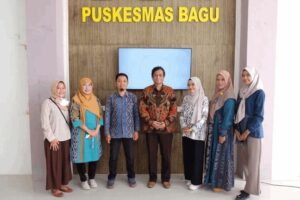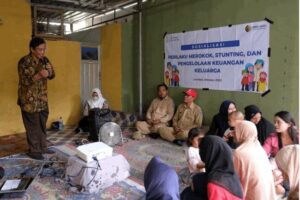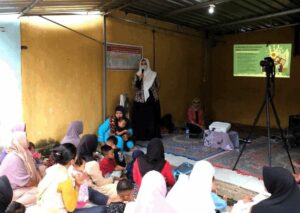
There are several things that can cause a child to become stunted, one of which is smoking behavior. Based on the results of research contained in Journal of Family and Economic Issues 1-13 entitled “Do Parental Smoking Behaviors Affect Children’s Thinness, Stunting, and Overweight Status in Indonesia? Evidence from a Large-Scale Longitudinal Survey”, it shows that children living in homes with smoking parents tend to have slower growth in weight and height(stunting).).
In support of government programs in implementing priority activities for Assisting Families at Risk of Stunting stated in National Action Plan (RAN) Number 12 of 2021 concerning Acceleration of Decreasing Numbers of Stunting in Indonesia in 2021-2024, the Community Service Team (Pengmas) of Faculty of Economics and Business, Universitas Indonesia (FEB UI) collaborated with the Health Office of Central Lombok Regency for holding a socialization with the theme “The Relationship of Smoking Behavior and Stunting and Education on Financial Management and Entrepreneurship” in the working area of Sintung Public Health Center, Hamlet Village, Central Lombok Regency, on Monday (03/10).
Ir. Aryana Satrya, M.M., Ph.D., IPU., Asean Eng., as the Head of FEB UI Community Service Team, in his presentation said that research from Center for Social Security Studies (PKJS) UI in 2018 shows that an increase in cigarette spending accompanied by a decrease in protein and carbohydrates food expenditure will have a long-term impact on the stunting condition of children. In addition to the substitution of basic expenditure funds for cigarettes, many studies have shown that there is a link between smoking behavior and stunting that can also occur due to exposure to cigarette smoke during the womb.
“This shows that there is a need for support from cross-sectors, academics, and grassroots in encouraging the acceleration of stunting reduction through cigarette consumption control. Support from local governments and the community is very important in breaking the chain of poverty from the roots through policies to control cigarette consumption from the household level so that family expenses are spent properly,” said Aryana.
Aryana’s statement was reinforced by Head of Sintung Village Deni Alpian A.P., who mentioned that even in difficult economic conditions, some people are willing to go into debt to buy cigarettes, but not willing to go into debt to buy basic necessities. On this occasion, Dr. Elok Savitri Pusparini, S.E., M.M., a member of the FEB UI Community Service Team, delivered material on household financial management and entrepreneurship as a further step to improve the family economy.
“This can encourage cadre representatives and the community who are present to be able to pass on knowledge and encouragement to the wider community on how to allocate household spending money to things that are basic needs and beneficial for the family, including nutritious food and education, instead of being used for buying cigarettes. Moreover, some of the participants also work as entrepreneurs,” said Elok.

Head of the Technical Implementation Unit (UPTD) of Bagu Public Health Center, Pringgarata, Central Lombok Regency, Dr. Lale Yufila, said that Bagu public health center has a focus on stunting in two villages, one of which is Sintung Village. This village has a very high case of stunting, with over 100 cases of stunted children. In handling this, so far Bagu Public Health Center has opened classes for high-risk pregnant women, provided biscuits for pregnant women with chronic energy deficiency (CEC) and anemia, provided additional food (PMT), and provided education on local food processing.
“We also have an introspective survey to see the economic capacity of the community. As a result, the average economic class of our community is the lower middle class. Most of their jobs are farmers and women merchants. They also do not have health and education savings. The survey states that 70% of families have smoking members,” said dr. Lale.
In addition to supporting government programs, this community service is also a manifestation of the 1st Sustainable Development Goals (SDGs), namely “End Poverty in All Its Forms Everywhere”. The realization is done by instilling the importance of entrepreneurship, including household financial management. People are expected not to spend their money on cigarettes as research shows a significant link between cigarette consumption and poverty levels.

Furthermore, this community service also supports the 2nd SDGs, namely “End Ending Hunger, Achieving Food Security and Good Nutrition, and Promoting Sustainable Agriculture” and the 3rd SDGs, namely “Ensuring Healthy Lives and Improving the Welfare of All Populations of All Ages.” which is expected to be achieved by instilling the importance of spending money on buying nutritious food and improving education instead of buying cigarettes, as well as increasing welfare with various entrepreneurial efforts.



